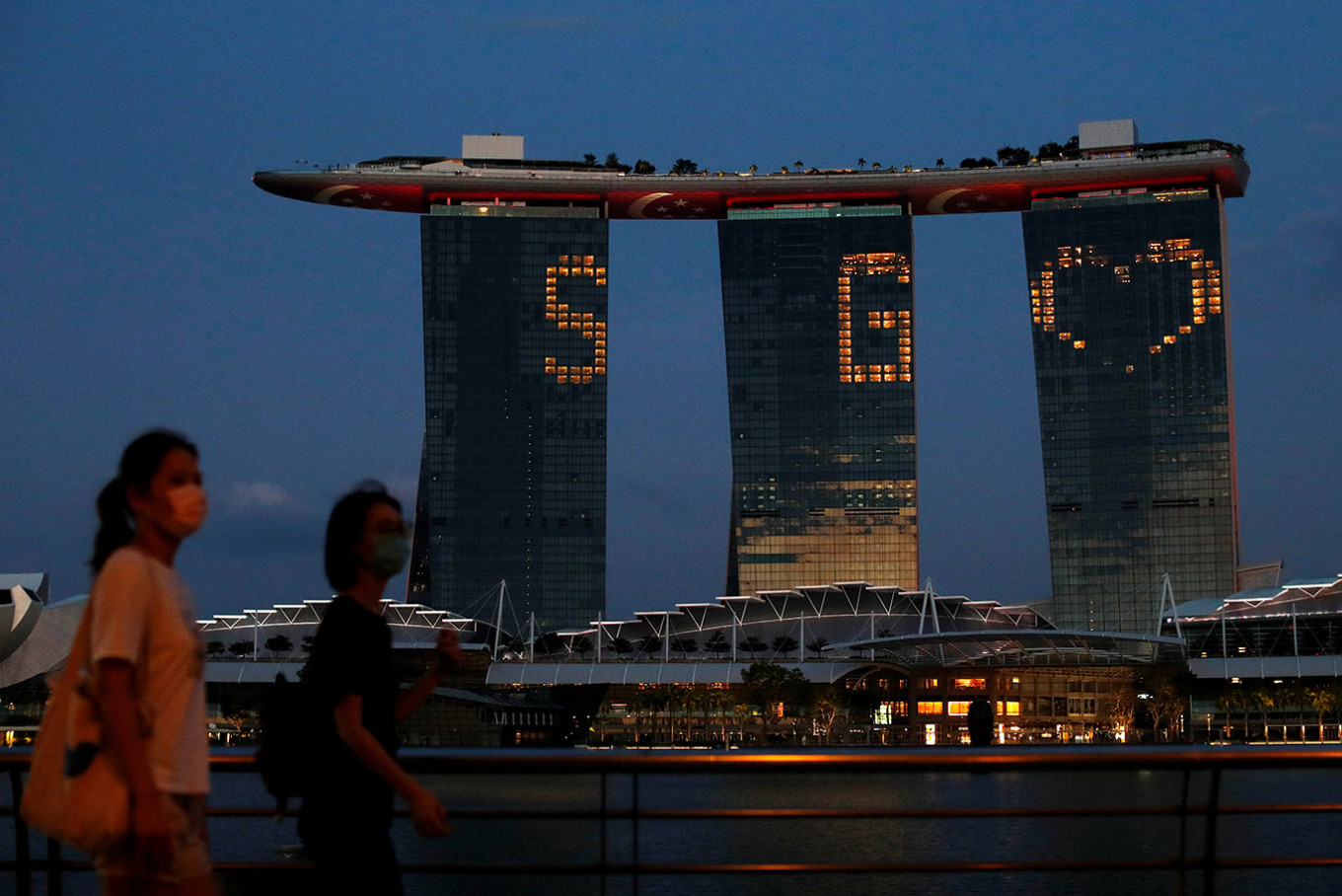Popular Reads
Top Results
Can't find what you're looking for?
View all search resultsPopular Reads
Top Results
Can't find what you're looking for?
View all search resultsSingapore gets stricter on enforcement to curb spread of virus
The government has closed beaches, and some areas of parks and nature reserves, saying “tougher measures” are necessary as safe-distancing measures aren’t being strictly followed. It is also making it mandatory for commuters to wear masks on public transport even after the end of a partial lockdown period.
Change text size
Gift Premium Articles
to Anyone
S
ingapore will start imposing fines on first-timers who flout social-distancing rules, while those who aren’t wearing masks may be barred from entering some premises which provide essential services, as the spread of coronavirus in the city-state showed few signs of abating.
The government has closed beaches, and some areas of parks and nature reserves, saying “tougher measures” are necessary as safe-distancing measures aren’t being strictly followed. It is also making it mandatory for commuters to wear masks on public transport even after the end of a partial lockdown period.
“In theory, we could keep most places open, so long as safe distancing measures are strictly adhered to,” Minister for National Development Lawrence Wong wrote in a Facebook post on Saturday. “But increasingly we see that this is hard to achieve.”
The country reported its highest daily increase of infections Thursday with more than 200 of the 287 new cases linked to foreign worker dormitories, where inhabitants often stay in cramped conditions. The number of new cases were at 198 on Friday and 191 on Saturday, with many infections as yet unlinked to known clusters.
Singapore has banned social gatherings and shuttered most workplaces till at least May 4 as part of measures to slow the pace of infections. Schools are also closed, and only those providing essential services are allowed to remain open during what it’s calling a “circuit breaker” period. Starting Sunday, people visiting various markets, convenience stores, pharmacies and shopping malls will have to wear masks, or be denied entry, authorities said in a statement.
The government, which has distributed masks to each household, will make it compulsory to wear them on public transport after the partial lockdown is over and buses and trains become crowded again, according to Transport Minister Khaw Boon Wan.
“This will minimize transmission in public transport during post-CB period when safe distancing is compromised,” Khaw said in a Facebook post on Saturday. “To prepare for this, we will get commuters to wear masks, now, when using public transport.”
Khaw didn’t say how long it will remain mandatory for the masks to be used.
Enforcement officers will impose a fine of S$300 even on first-time offenders who violate circuit breaker rules, Minister for the Environment and Water Resources Masagos Zulkifli wrote in a Facebook post. There are still too many people not taking the circuit breaker measures seriously, Masagos said on Saturday.
“We issued more than 3,000 stern warnings today, and more fines,” he wrote. “Stiffer penalties are clearly needed.”
The government has repeatedly asked senior citizens to stay at home, with Prime Minister Lee Hsien Loong making a “special appeal” to them on Friday to remain indoors for their own safety.
“I am one of you, so I know how you feel,” the 68-year-old leader said. “But please understand: We are telling you to stay at home for your own safety. Older people are more vulnerable to the virus. If we catch Covid-19, it is a serious matter. Our chances of dying are much higher.”
Singapore will set up two floating accommodations to temporarily house healthy foreign workers starting next week, the Maritime and Port Authority of Singapore said Saturday. Foreign workers will go through health checks including swab tests before boarding, and the government will arrange for their daily essential needs while a medical facility will be set up nearby on land.
The facilities housing thousands of foreign workers have emerged as one of Singapore’s biggest challenges in its fight to stem the coronavirus. With the new cases, those groups now account for about a quarter of all infections. There are more than 284,000 foreign workers in the construction sector, according to June 2019 data published by the manpower ministry. That accounts for nearly 5% of Singapore’s population of 5.7 million.







